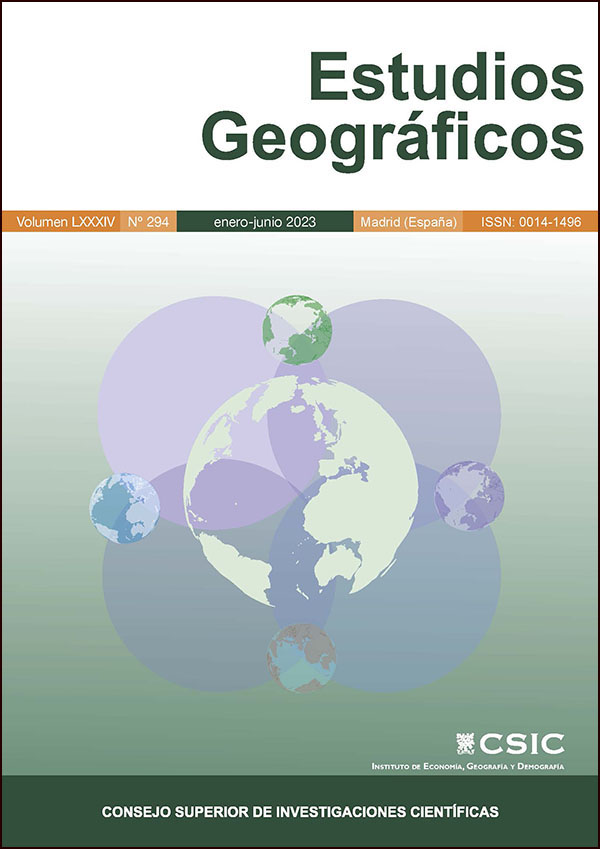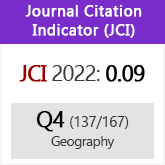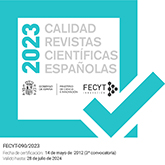A geographical approach to the impacts of the touristification of nightlife in the Lisbon neighbourhood of Cais do Sodré
DOI:
https://doi.org/10.3989/estgeogr.2023135.135Keywords:
nightlife, urban tourism, touristification, cultural heritage, LisbonAbstract
Over the last two decades, the expansion of the tourism-oriented nighttime leisure economy in a significant number of European cities can be simultaneously seen as both a result and a cause of the rapid and intense touristification of their central urban areas. In turn, what could be termed as the touristification of ‘the night’ has undoubtedly entailed the emergence of numerous significant negative spatial, social, economic, cultural, environmental, public health impacts, including the loss of local historical-architectural and/or cultural heritage. This article analyses how the touristification of ‘the night’ in the former harbour neighoborhood of Cais do Sodré, in Lisbon city centre, has triggered both a profound spatial transformation of the study area and a material, symbolic and heritage dispossession of the local community. The results shown in this article have been generated from observational fieldwork carried out between 2015 and 2019. The article ends up by remarking the urgent need in fostering the design and implementation of new public policies in the economic, cultural and urban governance spheres that include the cataloguing and protection of the most representative tangible and intangible cultural heritage of the nocturnal city.
Downloads
References
Câmara de Lisboa quer encontrar solução para discotecas Jamaica, Tokyo e Europa (07/03/2016). Sapo.pt.. Recuperado de: https://rr.sapo.pt/noticia/pais/2016/03/07/camara-de-lisboa-quer-encontrar-solucao-para-discotecas-jamaica-tokyo-e-europa/48696/
Sabotage Club: O comunicado oficial sobre o encerramento. (09/09/2019). Arte Sonora. Recuperado de: https://artesonora.pt/breves/sabotage-club-o-comunicado-oficial-sobre-o-encerramento/
Almeida, S. (25/10/2019.). Oslo despede-se da 'rua cor-de-rosa' no sábado. Público, Recuperado de: https://www.publico.pt/2018/10/25/local/noticia/oslo-despedese-rua-corderosa-sabado-1848912
Almeida-García, F., Cortés-Macías, R. y Parzych, K. (2021). Tourism impacts, tourism-phobia and gentrification in historic centers: The cases of Málaga (Spain) and Gdansk (Poland). Sustainability, 13(1), 408. https://doi.org/10.3390/su13010408
Aramayona, B. y García-Sánchez, R. (2021). Decoding middle-class protest against low-cost nocturnal tourism in Madrid. In A. Smith y A. Eldridge. (Eds.), Tourism and the night: rethinking nocturnal destinations (pp. 10-23). Londres, Reino Unido: Routledge. https://doi.org/10.4324/9781003142096-2
Aramayona, B. y García-Sánchez, R. (2019). Decoding middle-class protest against low-cost nocturnal tourism in Madrid. Journal of Policy Research in Tourism, Leisure and Events, 11(3), 380-393. https://doi.org/10.1080/19407963.2019.1584627
Araya López, A. (2020). Policing the'anti-social'tourist. Mass tourism and 'disorderly behaviors' in Venice, Amsterdam and Barcelona. Partecipazione e Conflitto, 13(2), 1190-1207. Recuperado de: http://siba-ese.unisalento.it/index.php/paco/article/view/22509
Barcón, A. R. (2020). El papel de la clase creativa en la gentrificación comercial del centro histórico de A Coruña. Finisterra, 55(113), 89-116.
Bell, D. (2008). Destination drinking: Toward a research agenda on alcotourism. Drugs: Education, Prevention & Policy, 15(3), 291-304. https://doi.org/10.1080/09687630801934089
Bethmann, C. (2018). Here come the Barbarians. Perceptions of alcotourism in golden Sands, Bulgaria. En B. Owsianowska y M. Zkiewicz.. (Eds.), Anthropology of tourism in Central and Eastern Europe: Bridging worlds (pp.165-180). Lanham, Massachussets, Estados Unidos de América: Lexington Books.
Canaza-Choque, F. A. y Huanca-Arohuanca, J. W. (2022). El poder del soberano. Furia globalizadora, fuerzas neoliberales y el devoramiento del Estado en la planetarización del capital. Revista Revoluciones, 4(10), 64-75. https://doi.org/10.35622/j.rr.2022.010.006
Carlisle, S. y Ritchie, C. (2021). Permission to rebel: A critical evaluation of alcohol consumption and party tourism. International Journal of the Sociology of Leisure, 4(1), 25-44. https://doi.org/10.1007/s41978-020-00061-4
Chatterton, P. y Hollands, R. (2003). Urban nightscapes: Youth cultures, pleasure spaces and corporate power. Londres, Reino Unido: Routledge. https://doi.org/10.4324/9780203402054
Chhabra, D. (2010). Back to the past: A sub-segment of Generation Y's perceptions of authenticity. Journal of Sustainable Tourism, 18(6), 793-809. https://doi.org/10.1080/09669582.2010.483280
Christiani, K. (25/03/2012). The rebirth of Lisbon's Cais do Sodré. BBC-Travel Channel. Recuperado de: https://www.bbc.com/travel/article/20120320-the-rebirth-of-lisbons-cais-do-sodre
Cócola-Gant, A. y López-Gay, A. (2020). Transnational gentrification, tourism and the formation of 'foreign only' enclaves in Barcelona. Urban Studies, 57(15), 3025-3043. https://doi.org/10.1177/0042098020916111
Cohen, E. (1988). Authenticity and commoditization in tourism. Annals of Tourism Research, 15(3), 371-386. https://doi.org/10.1016/0160-7383(88)90028-X
Consiglieri, C. (2004). O Cais do Sodré em postal antigo. Lisboa, Portugal: Livros Horizonte.
Diken, B. y Laustsen, C. B. (2004). Sea, sun, sex and the discontents of pleasure. Tourist Studies, 4(2), 99-114. https://doi.org/10.1177/1468797604054376
Eldridge, A. y Jović, M. (2022). Night tourism. En A. M. Hjalager. (Ed.), Encyclopedia of tourism management and marketing (pp. 347-350). Cheltenham, Reino Unido: Edward Elgar Publishing. https://doi.org/10.4337/9781800377486.night.tourism
Eldridge, A. y Smith, A. (2019). Tourism and the night: Towards a broader understanding of nocturnal city destinations. Journal of Policy Research in Tourism, Leisure and Events, 11(3), 371-379. https://doi.org/10.1080/19407963.2019.1631519
Estevens, A., Cocola-Gant, A., López-Gay, A. y Pavel, F. (2023). The role of the state in the touristification of Lisbon. Cities, 137, 104275. https://doi.org/10.1016/j.cities.2023.104275
Faria Moreira, C. (06/09/2019). O Sabotage, 'ponto de ignição' do rock em Lisboa, tem fim anunciado. Público. Recuperado de: https://www.publico.pt/2019/09/06/local/noticia/sabotage-ponto-ignicao-rock-lisboa-fim-anunciado-1885532
Farinha, R. (11/08/2022). A noite em que o Tokyo foi da prostituição à música (e outras histórias do Cais do Sodré). Nit.. Recuperado de: https://www.nit.pt/cultura/musica/a-noite-em-que-o-tokyo-foi-da-prostituicao-a-musica-e-outras-historias-do-cais-do-sodre
Fernandes Martins, C. (13/03/2016). Vi a tua filha sair de um bar no Cais do Sodré. Público. Recuperado de: https://www.publico.pt/2016/03/13/sociedade/noticia/vi-a-tua-filha-sair-de-um-bar-no-cais-do-sodre-1725852
França, J. A. (2008). Lisboa: História física e morall. Lisboa, Portugal: Livros Horizonte.
Fundo Sete Colinas - Relatório de Contas. (2019). Lisboa, Portugal: SILVIP - Sociedade Gestora de Fundos de Investimento Imobiliário, S. A. Recuperado de: https://web3.cmvm.pt/sdi/fundos/app/rc.cfm?num_fun=%23%214%3B%5F%0A
Garcia, L. M. (2016). Techno-tourism and post-industrial neo-romanticism in Berlin's electronic dance music scenes. Tourist Studies, 16(3), 276-295. https://doi.org/10.1177/1468797615618037
García-Sánchez, R., Martínez, J. M., Corraliza, J. A., Quintana, B. A. y Martín, M. J. (2019). ¿Vecinos de toda la vida? Nimby, ocio nocturno y desapropiación en centros urbanos. La Latina, en Madrid. Athenea Digital. Revista de pensamiento e investigación social, 19(1), e2194. https://doi.org/10.5565/rev/athenea.2194
Giordano, E., Manella, G., Rimondi, T. y Crozat, D. (2019). The spatio-temporal geographies of public spaces at night and their regulation as source of conflict. The cases of Montpellier and Bologna Espace, Populations, Sociétés, 2019/1. [Online]. https://doi.org/10.4000/eps.8725
Guérin, F., de Raphélis, M. y Mallet, S. (2022). Night-time as a strategic referent for an intermediary city: Between attractiveness and standardization of the uses. European Planning Studies, 30(8), 1401-1420. https://doi.org/10.1080/09654313.2021.1877260
Guy, D. J. (1991). Sex & danger in Buenos Aires: Prostitution, family, and nation in Argentina (Vol. 1). Lincoln, Nebraska, Estados Unidos de América: University of Nebraska Press.
Henriot, C. (2001). Prostitution and sexuality in Shanghai: A social history, 1849-1949. Cambridge, Reino Unido: Cambridge University Press.
Horner, S. y Swarbrooke, J. (2004). Clubbing and party tourism in the Mediterranean. En International Cases in Tourism Management (pp. 233-41). Oxford, Reino Unido: Elsevier Butterworth-Heinemann https://doi.org/10.1016/B978-0-7506-5514-9.50031-3
Iwanicki, G. y Dłużewska, A. (2018). Party space in Cracow and Warsaw: Partying and conflicts. Ekonomiczne Problemy Turystyki, 44, 139-145. https://doi.org/10.18276/ept.2018.4.44-11
Iwanicki, G. y Dłużewska, A. (2015). Potential of city break clubbing tourism in Wrocław. Bulletin of Geography. Socio-economic Series, 28, 77-89. https://doi.org/10.1515/bog-2015-0017
Knox, D. (2009). Mobile practice and youth tourism. En P. Pons, M. Crang y P. Travlou. (Eds.), Cultures of mass tourism. Doing the Mediterranean in the age of banal mobilities (pp. 143-155). Surrey, Reino Unido: Ashgate.
Lusa (08/03/2016). PSD de Lisboa diz que caso de discotecas do Cais do Sodré é "motivo de preocupação". Público. Recuperado de: https://www.publico.pt/2016/03/08/local/noticia/psd-de-lisboa-diz-que-caso-de-discotecas-do-cais-do-sodre-e-motivo-de-preocupacao-1725571
Krolow, P. y Dias, P. (2022). Instagramable experiences at brunches in Lisbon: Search for taste or likes?. Comunicação Pública, 17(32).
Mach, L., Connors, J., Lechtman, B., Plante, S. y Uerling, C. (2022). Party tourism impacts on local stakeholders. Anatolia, 1-14. https://doi.org/10.1080/13032917.2022.2040914
Malet-Calvo, D. (2018). Understanding international students beyond studentification: A new class of transnational urban consumers. The example of Erasmus students in Lisbon (Portugal). Urban Studies, 55(10), 2142-2158. https://doi.org/10.1177/0042098017708089
Malet-Calvo, D. (2013). Procesos de revalorización patrimonial en el barrio de Alfama: El papel de los estudiantes Erasmus en la tematización de la ciudad. Etnográfica. Revista do Centro em Rede de Investigação em Antropologia, 17(1), 31-50. https://doi.org/10.4000/etnografica.2532
Martínez, F. (2015). Tallinn as a city of thresholds. Journal of Baltic Studies, 46(2), 127-155. https://doi.org/10.1080/01629778.2014.981673
Martins, P. (sin fecha específica, 2019). The show must go on - O início do fim do Sabotage?. Revista Bica. Recuperado de: https://revistabica.com/the-show-must-go-on-o-inicio-do-fim-do-sabotage-2/
Mattson, G. (2015). Bar districts as subcultural amenities. City, Culture and Society, 6(1), 1-8. https://doi.org/10.1016/j.ccs.2015.01.001
McConville, C. (1980). The location of Melbourne's prostitutes, 1870-1920. Australian Historical Studies, 19(74), 86-97. https://doi.org/10.1080/10314618008595626
Mendes, L. (2008). Nobilitação urbana no Bairro Alto: Análise de um processo de recomposição socio-espacial (Tesis de maestría). Instituto de Geografia e Odenamento do Território, Lisboa. Recuperado de: http://repositorio.ul.pt/handle/10451/1741
Milano, C., González-Reverté, F. y Benet Mòdico, A. (2023). The social construction of touristification. Residents' perspectives on mobilities and moorings. Tourism Geographies, 1-19. https://doi.org/10.1080/14616688.2022.2150785
Moura, D. (2022). Relatório sobre o Cais do Sodré e Bairro Alto. Lisboa, Portugal: Assambleia Municipal de Lisboa. Recuperado de: https://www.am-lisboa.pt/503000/1/001290,000240/index.htm?fbclid=IwAR3NwGOPWZRklmEfNxA6s4hpuyotLldVOITZqIwRJowOBwrP5CBXv1hlqcw
Navarrete Escobedo, D. (2019). Nuevas desigualdades urbanas: La apropiación global del patrimonio en los centros históricos mexicanos. Andamios, 16(39), 77-99. https://doi.org/10.29092/uacm.v16i39.675
Nilsson, J.H. (2020) .Conceptualizing and contextualizing overtourism: The dynamics of accelerating urban tourism. International Journal of Tourism Cities, 6(4), 657-671. https://doi.org/10.1108/IJTC-08-2019-0117
Nofre, J. (2021). La turistificación del ocio nocturno: Nuevos retos y desafíos en el estudio de la ciudad turística. Cuadernos Geográficos, 60(1), 80-94. https://doi.org/10.30827/cuadgeo.v60i1.13723
Nofre, J. (2013). Vintage nightlife: Gentrifying Lisbon downtown. Fennia: International Journal of Geography, 191(2), 106-127. https://doi.org/10.11143/8231
Nofre, J. y Eldridge, A. (2018). Exploring nightlife: Space, society & governance. Londres, Reino Unido: Routledge.
Nofre, J., Giordano, E., Eldridge, A., Martins, J. C. y Sequera, J. (2018). Tourism, nightlife and planning: Challenges and opportunities for community liveability in La Barceloneta. Tourism Geographies, 20(3), 377-396. https://doi.org/10.1080/14616688.2017.1375972
Nofre, J., Martins, J. C., Vaz, D., Fina, R., Sequera, J. y Vale, P. (2019). The 'Pink Street'in Cais do Sodré: Urban change and liminal governance in a nightlife district of Lisbon. Urban Research & Practice, 12(4), 322-340. https://doi.org/10.1080/17535069.2018.1449010
Nofre, J., Sánchez-Fuarros, I., Malet-Calvo, D., Martins, J.C., Pereira, P., Soares, I., Geraldes, M. y López-Díaz, A. (2017). Exploring nightlife and urban change in Bairro Alto, Lisbon. City & Community, 16(3), 330-344. https://doi.org/10.1111/cico.12248
Novy, J. y Colomb, C. (Eds.). (2017). Protest and resistance in the tourist city. Londres, Reino Unido: Routledge. https://doi.org/10.4324/9781315719306
Olt, G., Smith, M. K., Csizmady, A. y Pinke- Sziva, I. (2021). Gentrification, tourism and the night-time economy in Budapest's district VII - The role of regulation in a post-socialist context. In A. Smith y A. Eldridge. (Eds.),Tourism and the night: Nocturnal destinations (pp. 24-36). Londres, Reino Unido: Routledge. https://doi.org/10.4324/9781003142096-3
Pahissa, E. A. (2014). 'El barrio no se vende': Las barriografías de la Barceloneta como herramienta de resistencia vecinal frente al extractivismo urbano. Ecología Política, 48, 36-41. Recuperado de: https://www.ecologiapolitica.info/el-barrio-no-se-vende-las-barriografias-de-la-barceloneta-como-herramienta-de-resistencia-vecinal-frente-al-extractivismo-urbano/,
Pétonnét, C. (1982). L'Observation flottante L'exemple d'un cimetière parisien. L'Homme, 22(4), 37-47. Recuperado de: https://www.persee.fr/doc/hom_0439-4216_1982_num_22_4_368323 https://doi.org/10.3406/hom.1982.368323
Pettas, D., Avdikos, V., Iliopoulou, E. y Karavasili, I. (2022). 'Insurrection is not a spectacle': Experiencing and contesting touristification in Exarcheia, Athens. Urban Geography, 43(7), 984-1006. https://doi.org/10.1080/02723638.2021.1888521
Pincha, J. P. (07/03/2016). Donos do Jamaica, Tokyo e Europa tentam salvar espaços míticos da noite lisboeta. Observador. Recuperado de: https://observador.pt/2016/03/07/donos-do-jamaica-tokyo-europa-tentam-salvar-espacos-miticos-da-noite-lisboeta/
Pinke-Sziva, I., Smith, M., Berezvai, Z. y Padilla, M. C. (2020). Sustainable and competitive nightlife district?-Management of overtourism in Budapest. Marketing & Menedzsment, 54(1), 55-63. https://doi.org/10.15170/MM.2020.54.01.05
Pinke-Sziva, I., Smith, M., Olt, G. y Berezvai, Z. (2019). Overtourism and the night-time economy: A case study of Budapest. International Journal of Tourism Cities, 5(1), 1-16. https://doi.org/10.1108/IJTC-04-2018-0028
Pinho, M. y Marques, J. (2021). The bleisure tourism trend and the potential for this business-leisure symbiosis in Porto. Journal of Convention & Event Tourism, 22(4), 346-362. https://doi.org/10.1080/15470148.2021.1905575
Rocha Leite, M. (14/09/2022).Edifício que albergou discotecas Jamaica e Europa vai passar a ser um hostel. Público.. Recuperado de: https://www.publico.pt/2022/09/14/local/noticia/edificio-albergou-discotecas-jamaica-europa-vai-passar-hostel-2020564
Shaw, R. (2018). The nocturnal city. Londres, Reino Unido: Routledge. https://doi.org/10.4324/9781315560090
Silva, C. (14/09/2019). O Sabotage precisa de ajuda, Time Out Lisboa. Recuperado de: https://www.timeout.pt/lisboa/pt/noticias/o-sabotage-precisa-de-ajuda-091419
Silva, C. (10/11/2011). Cais do Sodré. Os novos inquilinos chegam à Pensão Amor e ao Bar da Velha Senhora. Ionline.. Recuperado de: https://ionline.sapo.pt/artigo/429701/cais-do-sodre-os-novos-inquilinos-chegam-a-pensao-amor-e-ao-bar-da-velha-senhora?seccao=Mais
Simões, S. (20/08/2011). Há vidas atrás dos balcões do Cais. Diário de Notícias. Recuperado de: https://www.dn.pt/gente/ha-vidas-atras-dos-balcoes-do-cais-1956688.html
Smith, A. y Eldridge, A. (Eds.). (2021). Tourism and the night: Rethinking nocturnal destinations. Londres, Reino Unido: Routledge. https://doi.org/10.4324/9781003142096
Smith, M. K., Egedy, T., Csizmady, A., Jancsik, A., Olt, G. y Michalkó, G. (2018). Non-planning and tourism consumption in Budapest's inner city. Tourism Geographies, 20(3), 524-548. https://doi.org/10.1080/14616688.2017.1387809
Thurnell-Read, T. P. (2012). Tourism place and space: British stag tourism in Poland. Annals of Tourism Research, 39(2), 801-819. https://doi.org/10.1016/j.annals.2011.09.009
Vieira de Jesus, D. S. (2017). Mar próximo, cidade distante: Economia criativa e regeneração urbana em Lisboa e Rio de Janeiro. Revista Grifos, 26(43), 125-156. Recuperado de: https://www.redalyc.org/pdf/5729/572967133007.pdf
https://doi.org/10.22295/grifos.v26i43.3884
Villar, P. (1996). Historia y leyenda del Barrio Chino, 1900-1992: Crónica y documentos de los bajos fondos de Barcelona. Barcelona, España: Edicions La Campana.
Zukin, S. (2008). Consuming authenticity. Cultural Studies, 22(5), 724-748. https://doi.org/10.1080/09502380802245985
Published
How to Cite
Issue
Section
License
Copyright (c) 2023 Consejo Superior de Investigaciones Científicas (CSIC)

This work is licensed under a Creative Commons Attribution 4.0 International License.
© CSIC. Manuscripts published in both the printed and online versions of this Journal are the property of Consejo Superior de Investigaciones Científicas, and quoting this source is a requirement for any partial or full reproduction.All contents of this electronic edition, except where otherwise noted, are distributed under a “Creative Commons Attribution 4.0 International” (CC BY 4.0) License. You may read here the basic information and the legal text of the license. The indication of the CC BY 4.0 License must be expressly stated in this way when necessary.
Self-archiving in repositories, personal webpages or similar, of any version other than the published by the Editor, is not allowed.
Funding data
Fundação para a Ciência e a Tecnologia
Grant numbers CEECIND/01171/2017;SFRH/BD/121842/2016
















